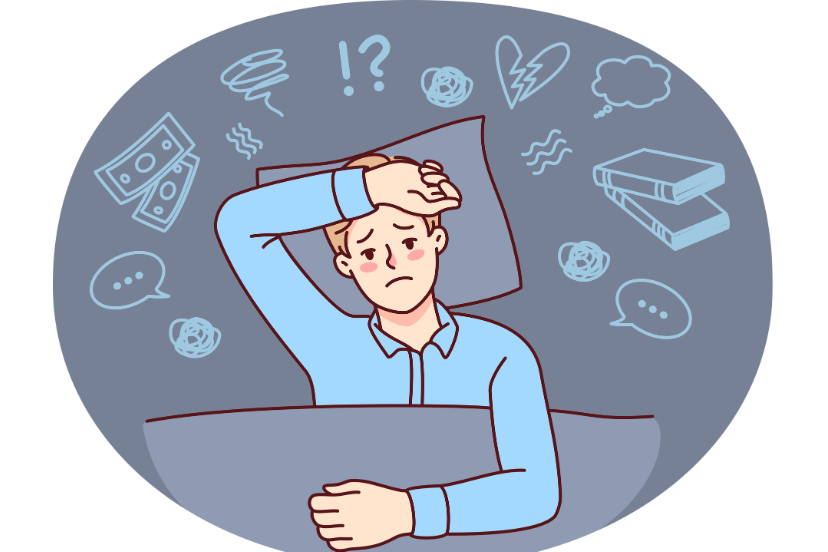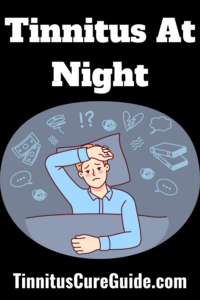Tinnitus At Night
Struggling with tinnitus at night? Discover proven methods to manage symptoms and improve sleep quality. Dive in for relief! As someone who deeply values the gift of hearing, I understand the distress caused by tinnitus, especially when it decides to make its presence known in the quiet of the night. Tinnitus, often described as a persistent ringing, buzzing, or hissing sound in the ears, can be particularly bothersome when trying to catch those precious hours of sleep. Join me as we explore the realm of tinnitus at night, delve into its causes, and uncover strategies to find solace in the silence once again.
What Is Tinnitus?
Tinnitus is when you hear phantom noises, like ringing or buzzing, in your ears when no external sound is present. It can stem from various causes, such as hearing loss, earwax blockage, or even high blood pressure. It’s often perceived more strongly in quieter environments.
Is Tinnitus Dangerous?
Tinnitus is generally not dangerous, but it can significantly impact your quality of life and emotional well-being. However, it can sometimes signal underlying issues like high blood pressure or earwax blockage, making medical consultation important for persistent symptoms.
Why Is Tinnitus Worse At Night?
Several reasons often arise for why tinnitus is worse at night:
- The quiet environment makes the ringing or buzzing sounds more noticeable.
- Stress and anxiety levels often rise at bedtime as people reflect on their day or worry about the next, amplifying the perception of tinnitus.
- The change in blood flow when lying down can intensify symptoms.
Understanding Tinnitus Worse At Night
Why Tinnitus Seems Louder At Night
Tinnitus often seems louder at night because the absence of ambient noise makes the ringing more noticeable. Additionally, stress and anxiety levels usually rise at night, amplifying your perception of tinnitus.
Environmental Factors
Have you ever noticed how the buzzing seems to amplify when you’re in a quiet room? That’s because the absence of ambient noise makes the tinnitus more noticeable. Just like a small stain on an otherwise clean shirt, your brain picks up on it instantly.
Psychological Factors
Stress and anxiety often spike during the late hours. And guess what? These emotional states can make your tinnitus more noticeable. It’s a vicious cycle!
Tinnitus Only At Night
Experiencing tinnitus only at night is a common complaint. The lack of daytime distractions and ambient noise makes you more aware of the ringing or buzzing. Elevated stress levels and sleep anxiety can make the condition more noticeable. Caffeine intake or salt-heavy dinners can also exacerbate symptoms, specifically at night.
Causes Of Tinnitus At Night
The root causes of tinnitus at night can be multifaceted. First and foremost, exposure to loud noises during the day can contribute to this nighttime phenomenon. Those concerts, busy streets, and even everyday use of headphones might be causing more harm than we realize. Additionally, stress and anxiety amplify the perception of tinnitus, which can become more pronounced when the mind isn’t preoccupied with the day’s tasks. Certain medications, such as high doses of aspirin and underlying medical conditions like high blood pressure or ear infections, can also play a role in orchestrating this nighttime symphony.
Impact On Sleep And Daily Life
The toll that tinnitus at night takes goes beyond the immediate annoyance. It can wreak havoc on our sleep patterns, turning our once-restful nights into a battleground of tossing and turning. The lack of quality sleep, in turn, affects our mood, cognitive function, and overall well-being. Imagine waking up every morning feeling like you’ve just been in a battle with your own mind.
The Effects Of Tinnitus On Sleep
Tinnitus disrupts sleep by making it difficult to fall asleep or stay asleep. The constant ringing can lead to sleep deprivation, affecting emotional well-being and overall quality of life.
Sleep Quality
Tinnitus can make falling asleep a real challenge, which leads to sleep deprivation and affects your overall quality of life. Good sleep quality is essential for overall well-being and can reduce the perception of tinnitus. A consistent sleep schedule, a comfortable mattress, and a dark, quiet room can improve your sleep experience.
Emotional Wellbeing
Long-term sleep deprivation can lead to issues like depression and heightened anxiety, further exacerbating your tinnitus. Emotional well-being plays a crucial role in how you perceive tinnitus. Managing stress, practicing mindfulness, and maintaining a positive outlook can reduce the negative emotional impact of the condition.
Lifestyle Changes To Help Manage Tinnitus At Night
Try sound therapy, exercise regularly, and adjust your diet to manage tinnitus at night. Limit caffeine and salt intake, and adopt stress management techniques like yoga and meditation for better sleep.
Sound Therapy
Have you ever tried sleeping to the sound of rain or ocean waves? Sound therapy can mask the tinnitus and help you sleep better. Sound therapy uses external noises to mask the perception of tinnitus. It can include white noise, nature sounds, or even specific music tracks. This therapy helps divert attention away from the ringing, aiding relaxation and sleep.
Diet And Nutrition
You are what you eat! Certain foods like caffeine and salty snacks can worsen tinnitus. Opt for a balanced diet instead. A balanced diet rich in vitamins and low in salt and caffeine can improve tinnitus symptoms. Foods like fruits, vegetables, and lean proteins provide essential nutrients supporting better hearing health.
Exercise And Physical Activity
Physical exhaustion can make it easier to fall asleep, ringing or not. Regular exercise boosts blood flow to the ear and promotes better sleep, helping to mitigate tinnitus symptoms. Activities like jogging, swimming, or brisk walking can significantly make a difference.
Stress Management
Yoga, meditation, deep-breathing exercises – whatever keeps you relaxed- can help manage tinnitus. Effective stress management techniques, such as mindfulness, meditation, and deep breathing exercises, can alleviate the psychological impact of tinnitus. Lowering stress levels often reduces the perceived intensity of the ringing.
Medical Treatments And Therapies
Medical treatments for tinnitus include prescription medications for symptom relief and hearing aids with sound generators. Cognitive Behavioral Therapy (CBT) can also help change your perception and response to tinnitus.
Medications
Some prescription drugs can alleviate the symptoms. Prescription medications like antidepressants or antianxiety drugs can alleviate tinnitus symptoms for some people. However, medications primarily target the emotional stress related to tinnitus, not the sound itself. Always consult a healthcare provider for personalized advice.
Cognitive Behavioral Therapy (CBT)
This psychological treatment can change your perspective on tinnitus and help you cope better. Cognitive Behavioral Therapy (CBT) helps you identify and change negative thought patterns related to tinnitus. By reframing your perception, CBT equips you with coping mechanisms to better manage the condition’s psychological impact.
Hearing Aids
Hearing aids with sound generators play a low-level background noise to mask tinnitus. These devices can reduce the perception of ringing by providing an alternate sound focus, making it less intrusive.
Handy Gadgets For Tinnitus At Night Relief
For night-time tinnitus relief, consider using white noise machines or sleep-inducing headphones. These gadgets emit calming sounds that can mask the ringing and help you fall asleep more easily.
White Noise Machines
White noise machines emit a consistent, ambient sound that masks other noises, including tinnitus. Creating a sound-rich environment helps you focus less on the ringing in your ears and more on falling asleep or concentrating on tasks. They’re especially useful for quieter settings.
Sleep-Inducing Headphones
Sleep-inducing headphones are designed for comfort and come preloaded with calming sounds. These headphones help to mask tinnitus by allowing you to listen to relaxing audio tracks, making it easier to fall asleep. They’re a great alternative to traditional sleep aids or medications.
Pre-Sleep Routine For Tinnitus Sufferers

For tinnitus sufferers, a pre-sleep routine can include relaxation techniques, ambient sound playlists, and consistent sleep times. Engaging in calming activities, like reading, can also set the stage for a restful night.
Tips For Setting Up A Routine
Consistency is key. Going to bed and waking up at the same time can condition your body for better sleep. To set up a routine, start by identifying essential tasks you need to accomplish daily. Prioritize them, allocate specific time slots, and stick to your schedule. Consistency and flexibility are crucial for a successful routine.
Relaxation Techniques
Soothing activities before bed, Relaxation techniques like deep breathing, meditation, and progressive muscle relaxation can ease stress and improve focus. These methods divert your attention from tinnitus, making falling asleep or concentrating on tasks easier.
Seeking Professional Help
When the nocturnal symphony becomes too overwhelming to bear, seeking professional guidance is a wise step. An audiologist can provide valuable insights into managing tinnitus and recommend appropriate treatments. Hearing aids, for instance, have shown promising results in minimizing the impact of tinnitus. Therapies such as cognitive behavioral therapy (CBT) can equip you with coping strategies, ultimately reducing the prominence of tinnitus in your life.
How I Cured My Tinnitus
I cured my tinnitus by adopting a multi-faceted approach under professional guidance. First, I consulted an audiologist who pinpointed potential underlying issues through extensive testing. Following that, I started sound therapy, which significantly lowered the intensity of the ringing. I also revamped my diet, cutting out caffeine and high-sodium foods while incorporating vitamin-rich fruits and vegetables. To manage stress, I took up daily meditation and yoga. My audiologist recommended a hearing aid with a built-in sound generator, which worked wonders for me. In a few months, the constant buzzing diminished to an occasional whisper, ultimately leading to a tinnitus-free life.
FAQs About Tinnitus At Night
Can tinnitus at night be cured completely?
While a complete cure might not always be possible, effective management strategies can significantly minimize the impact of tinnitus on your life.
Are there specific foods that worsen tinnitus symptoms at night?
Certain foods high in salt, caffeine, and alcohol have been linked to exacerbating tinnitus symptoms. Opt for a balanced diet to support auditory health.
Is tinnitus at night a sign of a more serious underlying condition?
In some cases, yes. It’s important to consult an audiologist or medical professional to rule out any underlying medical issues.
Why does tinnitus get worse at night?
Tinnitus often worsens at night due to the absence of ambient noise, making the ringing more noticeable. Higher stress and anxiety levels at night can also amplify your perception of tinnitus, making it more disruptive.
How to reduce tinnitus at night?
Use sound therapy or white noise machines to mask the ringing. Adopt a calming pre-sleep routine and limit caffeine and salt in your diet. Consult a healthcare provider for personalized treatment options.
Tinnitus At Night – Conclusion
Tinnitus at night might be an uninvited guest, but with the right strategies and a dash of perseverance, its tune can be hushed to a mere whisper. By understanding its causes, implementing healthy lifestyle changes, seeking professional help, and finding solace in shared experiences, you can regain control over your nights and wake up to mornings filled with hope and rejuvenation.
Disclaimer
This article is for informational purposes only and does not substitute professional medical advice. Always consult a licensed healthcare provider before beginning new treatments, supplements, or exercise programs for tinnitus or related conditions.






